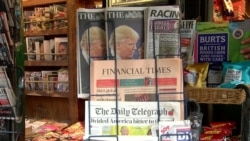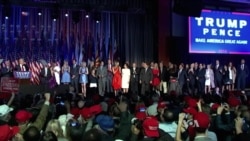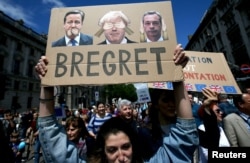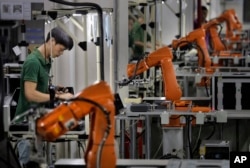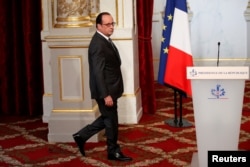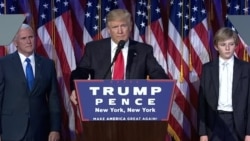People across the globe woke up to a different world Wednesday on news American voters have elected Donald Trump as the next U.S. president.
It is being called the Earth’s most watched election since World War Two, one that will transform American policy and America’s position in the world.
Analysts said the New York billionaire’s victory amounts to a seismic shift at a time when Washington’s relations with Russia are difficult, conflicts in Syria and Ukraine are still raging, the war on Islamic State militants is ongoing, China’s behavior is growing increasingly defiant and nationalistic, and hundreds of thousands of migrants and refugees are on the move.
WATCH: Trump's Win Sending Shockwaves Around the World
Many world leaders made no secret of their preference for Democratic Party candidate Hillary Clinton, who as Secretary of State was to many of them a known entity. What some U.S. voters interpreted as a lack of vision or new ideas, foreign leaders saw as continuation of existing policies and no surprises.
For Londoners, the shocking news was reminiscent of that morning back in June when they learned, despite poll predictions, Britain had voted to leave the European Union.
British Prime Minister Theresa May, who abstained from giving an opinion on the president-elect during the campaign, was among those congratulating Trump Wednesday. May said she looked forward to working with him to continue the enduring relationship between Britain and America, including a “strong and close” partnership on trade, security, and defense.
Germany’s Angela Merkel, who was also careful not to state preferences during the U.S. presidential race, made an oblique reference to inflammatory remarks Trump made about Muslims, Mexicans, and others during his campaign.
"Germany and America are bound together by values — democracy, freedom, respecting the rule of law, people's dignity regardless of their origin, the color of their skin, religion, gender, sexual orientation or political views," Merkel said. "On the basis of these values, I am offering to work closely with the future president of the United States, Donald Trump," she said.
At the United Nations, Secretary General Ban Ki Moon congratulated Trump while stressing the importance of the U.S. role in the U.N. "As a founding member of the United Nations and security council members permanent members of the security council, the United States is an essential actor across the international agenda," he said.
Where now?
A leap into the unknown is how leaders across the world see Trump’s election. The next U.S. leader has said he will tear up trade agreements and offer no guarantees to members of NATO who do not pay their share.
Martin Wolf, chief economics commentator at the Financial Times, said what NATO members see now "is one candidate who seems to stand for a completely different view of America’s role in the world.
"I mean completely different," he stressed, saying this is a person "who repudiates rather specifically the alliance framework, the NATO framework in particular, who has repudiated America’s commitment to the liberal trade system that America created, the sort of open globalization America promoted, that seems to be in some ways more sympathetic to America’s historic enemies, like Russia, than it is to Europe."
During his campaign, Trump targeted Beijing’s trade practices, threatening to slap 45-percent tariffs on Chinese imports.
"There's a whole range of relatively outlandish statements that Trump said during his campaign that if they were to come to pass, could create some pretty dramatic business and economic consequences for the region," Ethan Cramer-Flood, associate director of the Conference Board’s China Center for Economics and Business, said in Beijing.
Trump won on an America first platform. For Africa, analysts say that means expectations are realistic, and tempered.
“I think that what Africa needs to do, is to prepare for the worst case scenario, which would mean ... Donald Trump would focus first on American national interest and not necessarily on global interest, and not necessarily, therefore on African interests,” said Adams Oloo, a University of Nairobi politics professor. And if there was a time that Africa should start thinking of African solutions to African problems, the time is now,” he said.
Nervously watched election
French President Francois Hollande had publicly criticized Trump during the campaign. Hollande congratulated the president-elect, but said the U.S. election result “opens up a period of uncertainty” in U.S.-French relations. Hollande’s Socialist party faces a serious challenge from an anti-immigrant, right-wing surge spearheaded by Marine Le Pen, a Trump sympathizer, in general elections next year.
Hollande and other European leaders, including Italy’s Matteo Renzi, made little secret of their hope Hillary Clinton would be elected. “This is a time of great uncertainty and great change and what they hope for is a bit of certainty, a bit of predictability,” said Shanker Singham, an analyst at the Legatum Institute in London.
Singham and other observers say the question is what role a more inward looking America is going to play in the world. "Is the U.S. going to disengage or is the U.S. going to reengage with the world?” he asked.
WATCH: Donald Trump's Victory Speech
In his victory speech Wednesday, Donald Trump said his administration will deal fairly with the world, and seek common ground, not hostility. With the uncertainty also comes the hope a dramatic departure from the established world order could bring new opportunities and maybe some good surprises.
Bill Ide in Beijing and Jill Craig in Nairobi contributed to this report.




